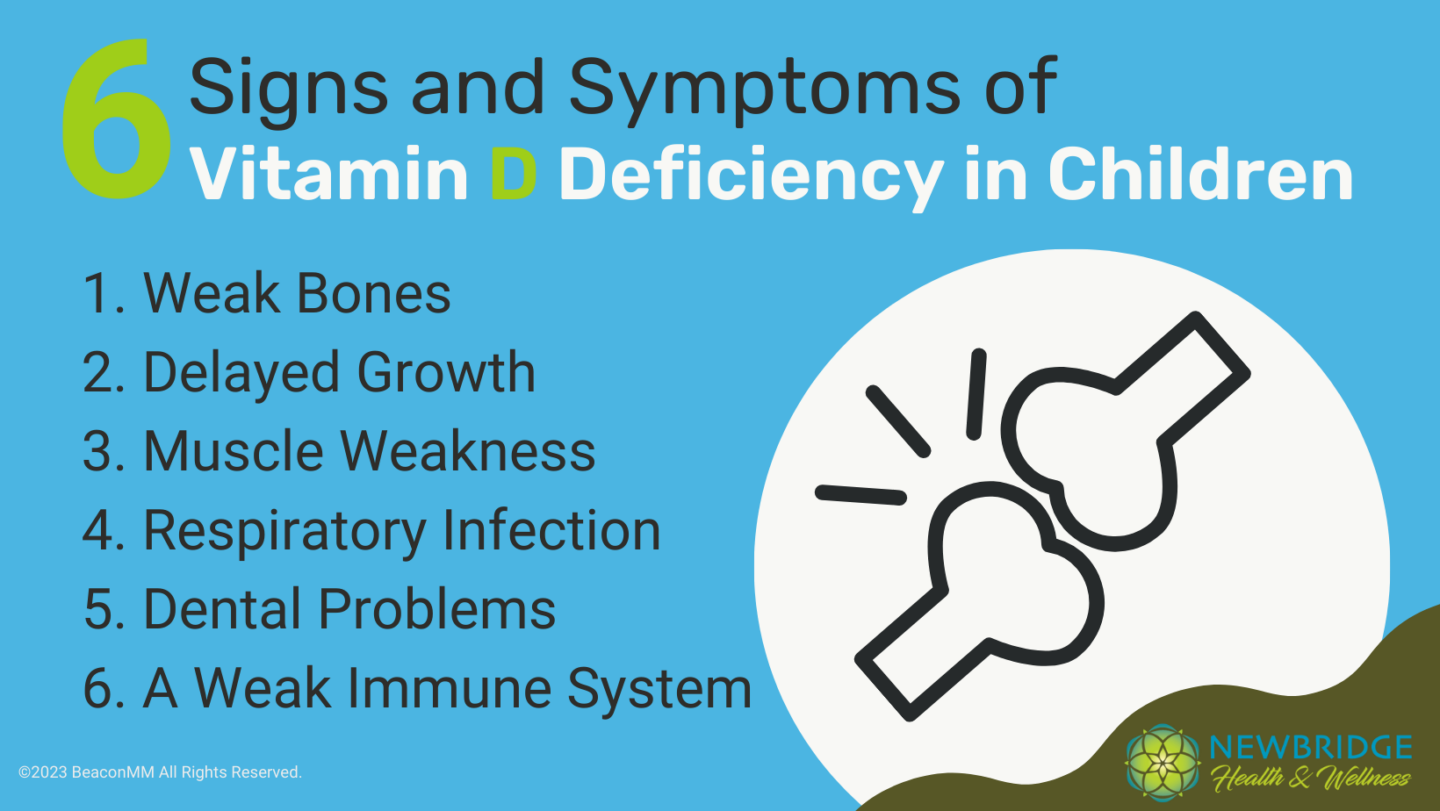Vitamin D is an essential nutrient that plays a crucial role in the growth and development of children. It is responsible for regulating the body’s calcium and phosphate levels, which are necessary for healthy bones, teeth, and muscle function. However, vitamin D deficiency is becoming increasingly common among children, with a report by Johns Hopkins Medicine stating that “Several large-scale studies have found that vitamin D deficiency is widespread – one in 10 U.S. children are estimated to be deficient – and that 60 percent of children may have suboptimal levels of vitamin D.”
In this blog, we will discuss the signs of vitamin D deficiency in children, natural treatment options, and vitamin D supplementation.
Is vitamin D deficiency affecting your child? Talk to a functional medicine provider at Newbridge Health and Wellness today and find out how we can help!
6 Common Signs and Symptoms of Vitamin D Deficiency in Children

Though there are many symptoms of vitamin D deficiency, these may be hard to detect. And parents need to know what to look for.
Stephanie Belseth APRN, CPNP of Newbridge Health and Wellness explains, “Outwardly, at first, we might not see vitamin D deficiency symptoms. But the longer it goes undetected, we can see growth issues, decreased immunity, bone and teeth issues and other symptoms. Vitamin D is important for many aspects of health. A child may experience lower limb pain that can wake them up at night, and sometimes what parents might think of as growing pains might actually be vitamin D deficiency, as one example. Frequent colds and decreased immunity can be another symptom she explains.
Five of the most common signs of vitamin D deficiency in children include:
- Weak bones
Vitamin D is crucial for the absorption of minerals and calcium, a process that is essential for healthy bone development. Children with vitamin D deficiency are more likely to develop weak bones, which can lead to fractures and other bone-related problems.
2. Delayed growth
Vitamin D deficiency can also affect the growth and development of children. Children with vitamin D deficiency may experience delayed growth, which can affect their overall physical and mental development.
3. Muscle weakness
Vitamin D is necessary for healthy muscle function. Children with vitamin D deficiency may experience muscle weakness, making it difficult for them to perform physical activities.
4. Respiratory infections
Studies have shown that vitamin D deficiency may increase the risk of respiratory infections, such as colds and flu, in children.
5. Dental problems
Vitamin D is necessary for healthy teeth development. Children with vitamin D deficiency may experience dental problems, such as cavities, gum disease, and tooth decay.
What Factors Contribute to Vitamin D Deficiency in Children?
Aside from more obvious signs, there are several factors that can contribute to Vitamin D deficiency in children. A few of these factors include:
- Living in northern latitudes
- Darker skin
- Lack of sunlight exposure
- Malnutrition
- Disorders that affect fat absorption
- Certain types of cancers
- Certain medications
- Genetics (a family history of rickets)
Regarding how prevalent vitamin D deficiency is in children, the answers are currently unclear because there is not universal vitamin D screening, and many factors need to be considered in different communities.
According to Stephanie Belseth, “We don’t really know what the scope of vitamin D deficiency is in children because currently there are no requirements for screening. And that’s unfortunate because there’s so much research on the benefits of Vitamin D. But overall, not getting enough sunlight, living in northern latitudes, having darker skin, and not eating the right foods or consuming largely vegetarian and vegan diets without appropriate supplementation, can lead to a vitamin D deficiency,” she states.
Vitamin D deficiency can also lead to a host of medical issues. Belseth notes, “A vitamin D deficiency can contribute to a weakened immune system, changes in growth, increased risk of breast or prostate cancer, osteopathic conditions, and diabetes to name a few. Basically, vitamin D deficiency can impact every disease – including those that affect cognitive functioning such as Alzheimer’s, ADHD, autism, depression, anxiety and schizophrenia.
Natural Treatment Options for Vitamin D Deficiency
We humans simply don’t get as much vitamin D as we once did. This is largely due to the fact that sunshine is the most abundant source of vitamin D, and people are spending much more time indoors than before, and when outdoors, heavy sunscreen use further blocks vitamin D capacity.
Additionally, animals and fish historically had ample sun exposure but with the advent of farmed fish and large concentrated animal feeding operations, many animals and fish we eat may not have been exposed to much sunlight, impacting the animal’s vitamin D storage in the fat, thus reducing our levels as humans.
Belseth notes, “Vitamin D is a critical nutrient that we should all be getting – ideally from sunshine. We don’t really get enough sunshine anymore. As much as 90 percent of our time is typically spent indoors in today’s world. People don’t really get the amount of sunshine that humans did before us. We need sunshine for optimal health, and we can be exposed without burning, which is not advised, beginning in short increments daily to build up protective melanin, before reducing sun exposure through protective clothing, shade, and safe sunscreens. For children, a lack of vitamin D can significantly impact growth and development – bones, teeth, immune system, nervous system, and the entire body.”
Thankfully, there are several natural ways to treat vitamin D deficiency in children. Some of these include:
- Sun exposure: The best natural source of vitamin D is sunlight. Children should spend some time outdoors in the sun every day. The skin produces vitamin D when it is exposed to sunlight. Just be careful to avoid sunburns
- Diet: Vitamin D is found in foods such as wild-caught fatty fish, the fat from organic meat from animals raised with plenty of sun exposure, organic pasture-raised egg yolks, and fortified dairy products. Children should include these foods in their diet to increase vitamin D intake.
- Supplements: Vitamin D3 with k2 supplements are available in the form of high-quality drops, capsules, chewables, and tablets. Children who do not get enough vitamin D from their diet or sun exposure need to take vitamin D supplements, and in northern latitudes, that includes most of us.
Here at Newbridge, as functional medicine experts, we always look at the root cause of disease and illness. This often starts at the foundation of physical and mental health: Nutrition. In order for parents to ensure that their children are getting enough vitamin D through diet, the right foods need to be consumed.
According to Belseth, “Natural ways that parents can ensure their children get enough vitamin D begins with the foods they eat. Pasture-raised or grass-fed animals typically get plenty of sunshine, therefore you’re going to get more vitamin D from eating them. And fish is a great source too. We used to get vitamin D from the fish that we caught wild because they often swam closer to the surface of the water. But we also have to be careful with toxicity levels in the fish that we eat today, so it’s important to know where they come from,” she explains.
The best way parents can help boost their children’s vitamin D levels is by ensuring that kids get incremental sun exposure each day to slowly build up protective melanin (after which using proper protective clothing and non-toxic and environmentally friendly sunscreen to prevent burning, if important). Additionally, foods from animals that get plenty of sun exposure (such as fatty fish, fish liver oil, egg yolks, aged cheeses), are all great sources of vitamin D.
Vitamin D Supplementation
Vitamin D supplementation is typically an effective way to treat vitamin D deficiency in children. The dosage of vitamin D supplements depends on the age of the child, personal, and environmental factors, and the severity of the deficiency. This is why it is important to consult a healthcare provider educated in nutrition, and vitamin D, before giving vitamin D3 supplements to children.
Belseth recommends thorough testing in order to ensure the correct dose of Vitamin D supplementation. She says, “We typically go with the standard recommended dose and base any dosage according to vitamin D in blood levels. But we also generally recommend more sun exposure, vitamin D3 with K2 liquid drops, periodic retesting after 4-8 weeks of supplementation, and of course increasing vitamin D-rich foods.”
Parents may notice several improvements, such as a stronger immune system and better resistance to respiratory and other viruses and infections after more vitamin D is introduced into the body. And because vitamin D acts as a hormone as well as a vitamin, it has anti-inflammatory benefits. This can result in the improvement of skin conditions such as eczema, autoimmune disorders, and other chronic illnesses.
Fight Your Child’s Vitamin D Deficiency With Newbridge Health and Wellness
Parents should be aware of the signs of vitamin D deficiency in children and take steps to ensure that their children get enough vitamin D through sun exposure, diet, and supplements.
At Newbridge Health and Wellness, we know the health of your child is your main priority. And we know that vitamin D intake is necessary for healthy bone and teeth development, muscle function, and overall growth and development of children. This is why our science-based functional medicine approach to improving vitamin D levels can be a major asset in the fight against vitamin D deficiency.
Are you ready to test your child and see how functional medicine can help with their vitamin D deficiency? Contact Newbridge Health and Wellness today and schedule an appointment.


